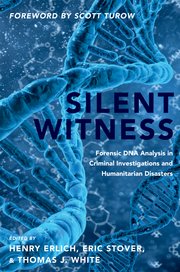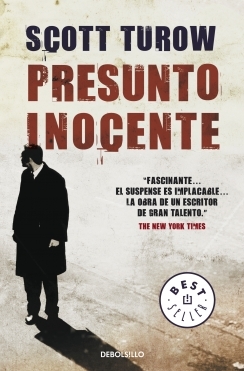Silent witness
forensic DNA evidence in criminal investigations and humanitarian disasters
- ISBN: 9780190909451
- Editorial: Oxford University Press
- Fecha de la edición: 2020
- Lugar de la edición: New York. Estados Unidos de Norteamérica
- Encuadernación: Rústica
- Medidas: 23 cm
- Nº Pág.: 394
- Idiomas: Inglés

Since its introduction in the late 1980s, DNA analysis has revolutionized the forensic sciences: it has helped to convict the guilty, exonerate the wrongfully convicted, identify victims of mass atrocities, and reunite families whose members have been separated by war and repressive regimes. Yet, many of the scientific, legal, societal, and ethical concepts that underpin forensic DNA analysis remain poorly understood, and their application often controversial.
Told by over twenty experts in genetics, law, and social science, Silent Witness relates the history and development of modern DNA forensics and its application in both the courtroom and humanitarian settings. Across three thematic sections, Silent Witness tracks the scientific advances in DNA analysis and how these developments have affected criminal and social justice, whether through the arrests of new suspects, as in the case of the Golden State Killer, or through the ability to identify victims of war, terrorism, and human rights abuses, as in the cases of the disappeared in Argentina and the former Yugoslavia and those who perished during the 9/11 attacks.
By providing a critical inquiry into modern forensic DNA science, Silent Witness underscores the need to balance the benefits of using forensic genetics to solve crime with the democratic right to safeguard against privacy invasion and unwarranted government scrutiny, and raises the question of what it means to be an autonomous individual in a world where the most personal elements of one's identity are now publicly accessible.
PART I: DNA Technology and Individual Identification
1. In the Beginning: Forensic Applications of DNA Technologies
Henry Erlich
2. Exonerating the Wrongfully Convicted
Justin Brooks and Desiree Moshayedi
3. Analysis of Forensic Mixtures
Michael Coble, Bruce Budowle, and Henry Erlich
4. Forensic DNA Data Banks and Data Mining: The Balance Between Privacy Interests and Public Safety
Frederick R. Bieber
5. Recent Developments in Forensic DNA Technology
Henry Erlich, Cassandra Calloway, and Steven Lee
6. Microbial Forensics: Concepts and Application from Epidemiology to Crime Investigations
Antti Sajantila and Bruce Budowle
PART II: Human Rights and Humanitarian Disasters
7. The Living Disappeared: Forensic DNA Typing and the Search for Argentina's Stolen Children
Mariana Herrera Pinero, Eric Stover, Melina Tupa, and Victor B. Penchaszadeh
8. Disappeared, Not Lost: Finding El Salvador's Missing Children
Andrea Lampros, Montserrat Martinez Gomez, Cristian Orrego Benavente, and Patricia Vasquez Marias
9. Large Scale Identification of the Missing: Experiences and Perspectives of the International Commission on Missing Persons
Andreas Kleiser and Thomas J. Parsons
10. Tracing Windblown Seeds: Genetic Information as a Biometric for Tracking Migrants in the United States
Sara H. Katsanis
11. Preventing a Third Death: Identification of Missing Migrants at the US-Mexico Border
Sara H. Katsanis and Katherine M. Spradley
12. Taking Stock: DNA Testing and Its Complex Truths
Dawnie Steadman and Sarah Wagner
PART III: Challenges and Debates
13. Admissibility of DNA Evidence in Court
Andrea Roth
14. Immediacy and Authority: Identification Efforts in Bosnia and Herzegovina and the World Trade Center Compared
Amy Mundorff and Sarah Wagner
15. Forensic Genetics, Ethics, Privacy, and Public Policy
Thomas J. White and Steven B. Lee
Conclusion: The Future of Forensic DNA Analysis
Index








